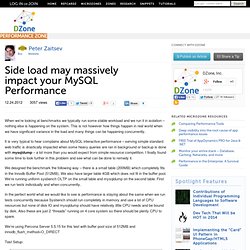

Side load may massively impact your MySQL Performance. When we’re looking at benchmarks we typically run some stable workload and we run it in isolation – nothing else is happening on the system.

This is not however how things happen in real world when we have significant variance in the load and many things can be happening concurrently. It is very typical to hear complains about MySQL interactive performance – serving simple standard web traffic is drastically impacted when some heavy queries are ran in background or backup is done with mysqldump – a lot more than you would expect from simple resource competition. I finally found some time to look further in this problem and see what can be done to remedy it. Efficient Pagination Using MySQL. 13.6.13.2 SHOW ENGINE INNODB STATUS and the InnoDB Monitors. 5 Ways to Boost MySQL Scalability. There are a lot of scalability challenges we see with clients over and over.

The list could easily include 20, 50 or even 100 items, but we shortened it down to the biggest five issues we see. 1. Tune those queries By far the biggest bang for your buck is query optimization. Queries can be functionally correct and meet business requirements without being stress tested for high traffic and high load. Enable the slow query log and watch it. 2. Master-master active-passive replication, otherwise known as circular replication, can be a boon for high availability, but also for scalability. 3.
It sounds very basic and straightforward, yet there are often details overlooked. Rob Williams' Blog. Wednesday May 04, 2011 Finally, a Cure for Crap MySQL Performance on OS/X Was working away yesterday and one of the guys on our team was using our 8 core Mac Pro, and suddenly went ‘whoa…‘ (in a hushed tone).

I was like ‘what? ‘ He said ‘this query runs so fast on this machine.‘ Then he A/Bed it against his 15” mbp (this generation) and the 8 core was 10x faster on the same query. If you have run MySQL on a mac at all, you probably know that abysmal performance has been an issue for a LONG time. The secret now? Meantime, we had another experience with MySQL the past few weeks that was most unsettling: we kept running into situations where the stupid db would fail with an error saying that a foreign key constraint had failed, then you go to check whether the value for the key you were inserting was in the referenced table, and it was. These are GA releases, mind you. Re: Lock issues with Table Partitioning. The problem is the locking it self, usually one only uses a couple of tables, i.e. lets say 10 table in a very big join.

That results in 10 locks that first needs to be stored in the tables, and then they need to be sorted (MySQL's way to avoid deadlocks, by always locking in the same order). And then the locks need to be locked. But if we use two partitioned tables with 200 partitions each, that results in 400 locks which take much more time to sort and to lock (even if only inserting one row, or a simple 'select * where primary_key=1' query). What we will try to do in 5.1 is to improve the lock sort algorithm and in a later version see if we can do the pruning before locking, and that way only lock the needed partitions. (Pruning would also need to support insert, update and delete...)
Regardless of what operation type, in 5.1 all partitions are locked at the same time (when opening the tables, before pruning takes place). 12.2.8.2 Index Hint Syntax. Choosing innodb_buffer_pool_size. November 3, 2007 by Peter Zaitsev39 Comments My last post about Innodb Performance Optimization got a lot of comments choosing proper innodb_buffer_pool_size and indeed I oversimplified things a bit too much, so let me write a bit better description.

Innodb Buffer Pool is by far the most important option for Innodb Performance and it must be set correctly. I’ve seen a lot of clients which came through extreme sufferings leaving it at default value (8M). Mysql-log-filter - Google Code. MySQLTuner, r. Optimiser une base de données sans aucune connaissance, c'est possible !

MySQLTuner est un script Perl qui effectue un audit basique de vos bases de données MySQL. Ce tableau de bord simplifié se termine par une liste d'optimisations du fichier de configuration de la base. Idéal pour les novices et simple et efficace pour dégrossir le travail pour les plus expérimentés. Ce script gère rapidement les optimisations simples d'une base MySQL. Suffisant pour les débutants, il reste important sur le moyen terme de comprendre l'utilisation de sa base et de fine-tuner les réglages ad'hoc. La documentation est orientée pour les utilisateurs de serveur Ubuntu. MySQLTuner - MySQLTuner. MySQL doesn't support fetch size.